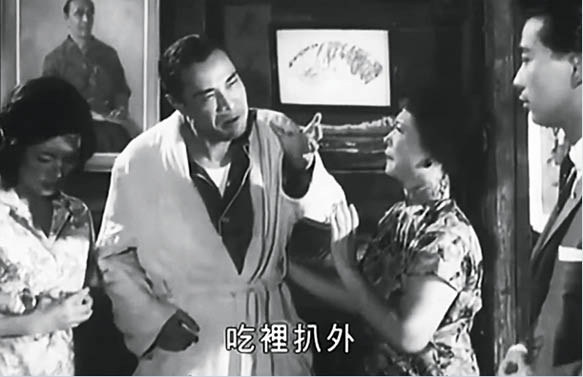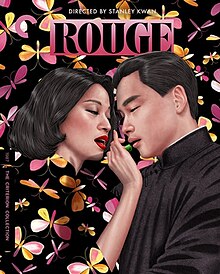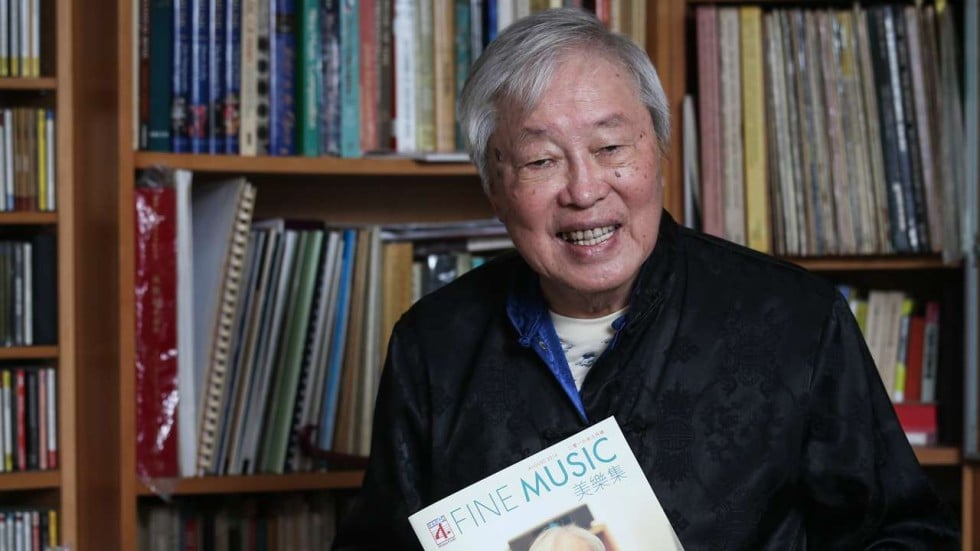
Under Hong Kong's Roof 香港屋簷下. On the surface, a family tragedy, but beneath the surface. "Under Hong Kong's roof", sinister forces are brewing. This film, from 1964, is one of Ng Chor Fan's (吳楚帆 ) masterpieces, in which he portrays the mental disintegration of a good man. It's also an allegory, a commentary on the "golden" years of Hong Kong when everything seemed perfect as long as you were cocooned from reality by privilege. As so often in Cantonese movies of the period, it begins with shots of the city - the central business district, its skyscrapers like fortresses of power. Ng Chor Fan plays Chu Wai Yan, a businessman. A luxury banquet has been arranged to announce the engagement of Chu's daughter (Mui Kam Fung 苗金鳳 ) to Willy, the son of Tong Po Fat, who was once Chu's assistant but now an even more powerful businessman. The party is in fact a summit meeting of the rich. The men are dressed in white tuxedos, the ladies bejewelled. But as Yan Yan and her fiancé enter, the band is playing loud and discordant Chinese music. Something's not right here but no-one notices, even though the entertainment for the evening is a western-style dance band playing soothing tunes.
The other businessmen are gossiping. Though Tong and Chu go back to when they were both young, Tong's a dodgy character, and Chu's position is dodgy. Chu's invited Mr Hong, a mutual a friend from youth, to the horror ofTong, since Hong is poor and old fashioned (a reminder that not everyone prospers). As Hong enters, the Chinese band appears again, also unnoticed. Somehow, couples are dancing.... Hong warns Chu that Tong is up to something bad but Chu doesn't believe it. Mysteriously, the guest of honour, Mr Yeung, the richest guy of all, doesn't turn up. Ominous. Suddenly, the glamorous singer of the band seems to be singing Cantonese opera. She looks her normal self but her voice becomes masculine, demonic, threatening death.
 The banks have foreclosed on Mr Chu and his guarantors, Tong and banker Yeung aren't backing him up. No matter how he begs, Chu is on his own. Overnight, he loses his business and home.. The servants have to go. Many have worked for the family for years. "You can't swim back to your native village", says Chu, offering them money. But they demur, from a sense of loyalty. The bailiffs arrive. The furniture gets auctioned. An old oil painting, a portrait of Mr Chu, comes up for sale. It's shabby. No-one can understand why there's a sudden bidding war between a poor woman (Mrs Lai, aka Tai Sum, ie "elder aunt", played by Lee Yuet ching 李月清) and a young merchant navy officer, Chiu Chung. Chiu was taken in by Chu when he was orpaned as a child. The old woman seems to know this, so she gives him the painting, and tells him where the Chu family have moved to — a crumbling hovel in a squatter settlement. Chiu Chung is shocked to see Chu, now dressed in traditional underclothes. Chu smiles as if he's happy. "Eat a bowl of rice, turn it upside down". (a proverb). He recounts the story behind the painting. Years ago, he took pity on a vagrant who came begging for food. He never saw the man again but a few years later, the painting arrived. Chu understood what the painting meant,to himself and to the man who painted it. Mrs Lai knows the story, too,which is why she spent thousands bidding for it. Who is she ? She says she's just an itinerant worker, moving from place to place but in this story, she's a force of unconditional goodness.
The banks have foreclosed on Mr Chu and his guarantors, Tong and banker Yeung aren't backing him up. No matter how he begs, Chu is on his own. Overnight, he loses his business and home.. The servants have to go. Many have worked for the family for years. "You can't swim back to your native village", says Chu, offering them money. But they demur, from a sense of loyalty. The bailiffs arrive. The furniture gets auctioned. An old oil painting, a portrait of Mr Chu, comes up for sale. It's shabby. No-one can understand why there's a sudden bidding war between a poor woman (Mrs Lai, aka Tai Sum, ie "elder aunt", played by Lee Yuet ching 李月清) and a young merchant navy officer, Chiu Chung. Chiu was taken in by Chu when he was orpaned as a child. The old woman seems to know this, so she gives him the painting, and tells him where the Chu family have moved to — a crumbling hovel in a squatter settlement. Chiu Chung is shocked to see Chu, now dressed in traditional underclothes. Chu smiles as if he's happy. "Eat a bowl of rice, turn it upside down". (a proverb). He recounts the story behind the painting. Years ago, he took pity on a vagrant who came begging for food. He never saw the man again but a few years later, the painting arrived. Chu understood what the painting meant,to himself and to the man who painted it. Mrs Lai knows the story, too,which is why she spent thousands bidding for it. Who is she ? She says she's just an itinerant worker, moving from place to place but in this story, she's a force of unconditional goodness.

Willy Tong arrives at the shack to end the engagement. "This place is like a pigsty, it smells and you can't even reach it by car!" Yan Yan collapses. She confesses that she's pregnant. Willy says it's Mr Chu's fault in the first place for pushing his daughter to marry money. Maddened with grief, Chu picks up a stick to beat Willy (who escapes with his chauffeur) and in the process, falls over and smashes his head. Chu's wife has a seizure. Both are in hospital, but Mrs Chu dies of a heart attack. Young Mr Chiu confronts the Tong family and gets beaten up by their thugs. But he's the one who gets arrested ! When Mr Chu comes home, head bandaged, it's clear that his wounds go much deeper. He acts out scenes from an imaginary Cantonese opera, making dramatic gestures, swinging a stick like a sword, singing madly. He runs into the main street where he goes berserk, smashing the fish tanks outside a restaurant. This, too, is a symbol on several different levels. Chu gets arrested and put into a psychiatric hospital. He doesn't recognize his kids, but mumbles the phrase "eat rice from a bowl, then turn it over". Yan Yan gets evicted form the sqautter hut. She tries to kill herself, but miraculously Mrs Lai appears and stops her, slapping her in the face. "Consider your dead mother, your sick father, your young siblings and your unborn child!", she says, "what right do you have to put yourself above them !" A concept that might not mean much in the west but matters in traditional values.
Yan Yan goes into labour. At the same time Willy Tong and new girfriend go speeding in a sports car which crashes. Mrs Lai takesYan Yan, her baby and siblings into her home. "You are our guardian angel". So Yan Yan gets a job, singing in a nightclub - an interesting detail, since it was in a nightclub where her Dad had his first psychotic delusion. Seaman Chiu tracks her down, orders Chinese tea - not alcohol - and asks to see her "You're crazy", says the waiter, "she doesn't talk to customers". Chiu visits Mrs Lai's home in a squatter village, where all the neighbours crowd in, looking. The younger kids have started school again, and Mr Chu is at last well enough to go home. Again Mrs Lai intervenes, she says that Yan Yan and Mr Chiu should be "like ox and cow". What's that mean, say the kids. Mr Chiu's been offered a management job on land paying $700, a fortune in those days. But all's not well, yet. The baby is called "Tong Tong" ie "sweetie" but as Yan Yan says, his past is as bitter as bitter gourd. Yan Yan thinks no-one will marry a fallen woman, but Mr Chiu proposes. He's carried the engagement ring around with him for years. Suddenly, though the baby diappears. He's been kidnapped by the Tong family, whose son survived the car crash but can't have children. the Tongs think they can get away with it since Yan Yan is "just a bargirl". They announce the child as their own, though people gossip. Mr Chu breaks into the announcement party, re-enacting the mania in which he becomes a character from opera, screaming, shouting and throwing things (see top photo) The Chus are ejected, returning home in a thunderstorm, crying for the lost child. Yet again Mrs Lai appears, the baby hidden under her coat. "If they can steal the child, I can steal it back!" . This time, the Tongs won't win. Mr Tong's been arrested for major fraud. Mr Chu bursts out laughing. "Who's crazy now" he says, "let's fill our bowls and eat again".




















